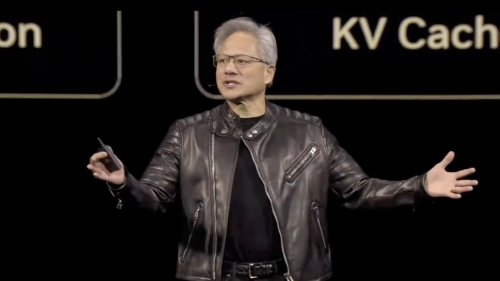Nvidia CEO Jensen Huang called for a careful, balanced approach to regulating China’s access to key U.S. technologies essential for advancing artificial intelligence.
Speaking with Citadel Securities on Tuesday, Huang cautioned that measures that hurt China could also backfire on the U.S., sometimes with even greater consequences.
“Before we leap towards policies that are hurtful to other people, take a step back and maybe reflect on what are the policies that are helpful to America,” Huang said.
Huang’s warning comes as Nvidia’s processors gain high demand in both the global AI race and the ongoing U.S.-China trade tensions. He emphasized that while he hopes U.S. expertise drives AI worldwide, nearly half of the world’s AI researchers are based in China.
“I think it’s a mistake to not have those researchers build AI on American technology,” he added.
READ: Nvidia, AMD directed to prioritize US over China in chip supply (
Huang explained that achieving a balance between keeping U.S. technology in a leading position and still allowing access to China will need a careful, thoughtful approach, rather than an all-or-nothing strategy. However, he noted that the current situation is very different: Nvidia is “100% out of China.” This highlights the challenge companies face in navigating both global business and political pressures, where decisions to protect U.S. technology can also limit engagement with a huge market like China.
“We went from 95% market share to 0%, and so I can’t imagine any policymaker thinking that that’s a good idea, that whatever policy we implemented caused America to lose one of the largest markets in the world,” he said.
Huang did not mention specific officials or administrations but in 2022, the Biden administration introduced rules limiting the export of Nvidia’s most advanced AI chips to China. In response, the company developed a new processor that complied with those restrictions.
READ: Nvidia to continue sponsoring H-1B visas despite Trump’s $100,000 fee (
In April, Nvidia revealed that the Trump administration had halted the sale of certain AI chips to China unless the company obtained special licenses, which would also be needed for future transactions. However, by August, the administration allowed limited exports of specific Nvidia and AMD chips to China, under an arrangement requiring 15% of the revenue to go to the U.S. government.
Reports suggest that Chinese regulators have advised local tech firms to avoid purchasing Nvidia chips that were specifically redesigned to comply with U.S. export restrictions. At the same time, Beijing has introduced its own export controls on rare earth minerals where key materials used in many advanced technologies like mirroring Washington’s curbs on AI chip exports.
The move led President Donald Trump to retaliate with an additional 100% tariff on Chinese imports. Negotiators from both countries are expected to resume discussions this week, ahead of a scheduled meeting between Trump and China’s leader later this month. For now, Huang told Citadel that Nvidia’s financial projections are based on the assumption that China will not be part of its business plans.


